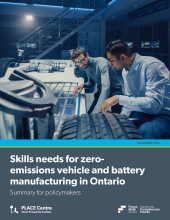Zero-emissions vehicles and battery manufacturing are growing sectors in Ontario. The province has attracted billions of dollars in investment from leading companies such as Stellantis and Volkswagen into communities like Windsor, London-St. Thomas and Kingston.
Yet for the province to capture the full economic benefits of these investments, the workforce needs to be prepared to fill emerging roles. For now, these new automotive plants offer more questions than answers: How ready are today’s automotive sector workers in these communities to fill emerging jobs? Will there be enough workers to fill all open roles? What new skills will workers need to learn? And what steps should governments, universities, colleges and technical colleges, unions, employers, and employment service providers take to position the workforce of the future for success?
The Smart Prosperity Institute, with support from Future Skills Centre, is publishing three reports that aim to answer these questions. Our work is the product of a year-long research process involving quantitative analysis, surveys, interviews, and in-person workshops in communities around the province.
- Shifting gears: How Ontario’s push to manufacturing zero-emissions vehicles will impact the workforce focuses on how skills and workforce needs will be influenced by changes in industries throughout the automotive and automotive parts manufacturing supply chain, driven by the transition to ZEVs.
- Future-proofing the automotive workforce: Supporting Ontario’s auto sector workers through the ZEV transition details the barriers that workers could face at every stage of their careers as they look to join the sector and grow in their careers.
- Skills needs for zero-emissions vehicle and battery manufacturing in Ontario: Summary for policymakers is a ten-page recap of the two reports’ major findings and key takeaways.



